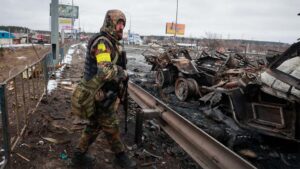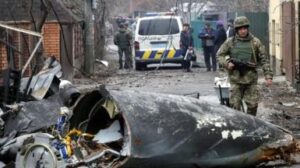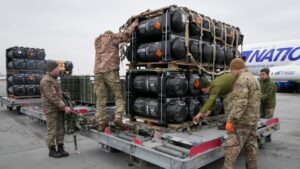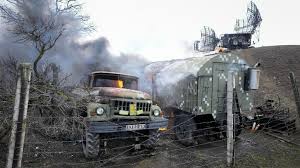Northern Black Sea Designated As ‘Warlike Area’ To Aid Seafarers
Parts of the Black Sea and Sea of Azov have been dubbed ‘warlike operations areas’, giving extra benefits to seafarers working in them.
Groups representing seafarers and their employers agreed to extra pay, benefits and rights for seafarers caught in the Ukraine war zones at a special meeting.

Seafarer painting. Credit Lionela Rob / Alamy Stock Photo Source: Lionela Rob / Alamy Stock Photo Seafarers working in designated areas are entitled to extra benefits and protections.
Employers and unions have agreed on extra pay, benefits, and granting the right to refuse to sail to seafarers caught in the Ukraine war zones.
Parts of the Sea of Azov and the northern Black Sea, including all Ukrainian ports, have been designated as ‘warlike operations areas’ by the Joint Negotiating Group of employers and the International Transport Workers’ Federation.
Warlike and high-risk areas are parts of the world where it is considered that there is a high level of exposure to safety and life risks due to a war, military tension, hostilities, pirate activity and other circumstances causing immediate danger to visiting vessels and their crews, according to the federation.
Seafarers working in designated areas are entitled to extra benefits and protections, including:
• A bonus equal to their basic wage payable for five days’ minimum, or more per day if longer
• Doubled compensation for death or disability
• The right to refuse sailing, with repatriation at the company’s cost and compensation equal to two months’ basic wages
• Recommendations to operate at ISPS Level 3, the highest risk level.
The designations will be reviewed every two weeks.
“The escalation in hostilities and conflict in Ukraine has put enormous pressure on seafarers of all nations and an industry already labouring under the demands and challenges of the pandemic,” the groups said in a statement.
The benefits cover seafarers on more than 9,000 ships that are part of the International Bargaining Forum agreement, a collective bargaining agreement.
“The parties agreed that the welfare of seafarers and the protection of their rights in this unprecedented situation was paramount to the spirit and intent of the IBF agreement,” the groups said.
The forum also considered helping governments with potential refugee deals for Ukrainian seafarers and their families, and to increase pressure on governments to waive visas to ease their repatriation.
Ukraine Conflict: Tanker Carrying Russian Oil Diverted From Wales
An oil tanker carrying Russian cargo which is scheduled to dock in Wales in UK has been diverted.
It comes as Adam Price has called for no Russian oil to enter Welsh ports while “innocent blood is being shed in Ukraine”.
Mark Drakeford backed the call made by the Plaid Cymru leader during First Minister’s Questions on Tuesday.
The tanker, Louie, was due to arrive at Milford Haven on Friday from the oil-loading port of Primorsk, Russia.

But shipping data shows its destination has been updated to Antwerp, Belgium, according to Vessel Finder.
The request to bar any Russian flagged or controlled vessels is among a series of economic sanctions imposed on Russia following its invasion of Ukraine.
Transport Secretary Grant Shapps wrote to ports on Monday, telling them to block access to Russian “flagged, registered, owned, controlled, chartered or operated vessels”.
However, on Tuesday Mike Ryan, harbourmaster at the Port of Milford Haven, said: “The DfT have today confirmed that UK government sanctions do not apply to cargo or to vessels purely because they are coming from Russia.
“We continue to work with DfT in following UK government direction,” he added.
Mr Price said ships were using flags of convenience, “in this case the Marshall Islands”, to get around the UK embargo.
The first minister added that “attempts would be made to try and subvert” laws, and that the UK government should act quickly to prevent “loopholes”.
One oil tanker, Pluto, had already docked at Milford Haven, in Pembrokeshire, on Saturday, before Transport Secretary Grant Shapps wrote to the ports.
“We understand and share the strength of feeling around Russian-connected vessels entering the Port of Milford Haven, particularly as our town has strong links with Ukraine in its twinning with the city of Uman,” said Mr Ryan.
“However, we do not have the power to unilaterally apply sanctions to a vessel bound for our port.”
Mr Ryan added: “The determination of whether a vessel falls within this definition is not simple, but we are keen to ensure that the sanctions from the UK government are applied here in Milford Haven.
“The Department for Transport (DfT) will be supporting us and other UK ports to identify vessels which they believe should not be serviced.”
Milford Haven is the UK’s largest energy port, handling tanker deliveries to local oil and gas refineries. It serves Valero Refinery, one of the largest manufacturers of fuels in north-west Europe. The UK imports 6% of its crude oil from Russia.
“The message is clear: Russian vessels are not welcome at UK ports,” said local Conservative member of the Senedd, Paul Davies.
“The UK transport secretary has been very clear. UK ports should not provide access to Russian vessels and further sanctions are being developed,” he added.
“I welcome this action as part of the package of measures to restrict Russian trade and hold Putin’s government to account for its disgraceful attack on Ukraine.”
It appears to have unloaded its consignment and is due to leave on Wednesday
Both Pluto and Louie sail under the flag of the Marshall Islands, but carry cargo from the Russian oil-loading port of Primorsk.
The Port of Milford Haven lists the Pluto as being berthed on the Valero dock since the evening of 26 February. It is scheduled to leave at 09:06 GMT on Wednesday.
Its next destination, according to Vessel Finder, is Derry in Northern Ireland.
Sanctions Impact Raises Concern Among South Korean Shipbuilders
The deepening Ukraine crisis and escalating sanctions against Moscow have stoked concerns over the prospects facing a huge orderbook of ships being built by South Korean shipyards for Russian owners
Shipbuilders are reeling from the uncertainty over whether they could get paid for constructing the fresh tonnage and whether newbuild ships will fall victim to Seoul’s newly announced export controls on Russia.

Sovcomflot and its partners have ordered a large fleet of LNG carriers to support its LNG projects in the Arctic.
Concerns are mounting among large South Korean shipbuilders that the escalating sanctions moves against Russia could adversely impact their prodigious orderbook of liquefied natural gas carriers.
“We are worried whether we can get the money from the shipowner as Russia is being sanctioned and their bankers are being blocked,” an official from Hyundai Heavy Industries told Lloyd’s List.
The company has three atlanticmax newbuilding LNG carriers that are scheduled for delivery to Sovcomflot from 2024.
The Russian shipowner is now being restricted from selling new debts and shares to raise funds from US entities, as part of the broader punitive actions taken by the US and its allies to hold Moscow liable for its invasion of Ukraine.
A November investors’ presentation showed it needed about $5bn to fund its entire orderbook of 32 ships over next three years.
However, more powerful measures — including freezing the Russian central bank’s overseas assets and barring some banks from the Swift interbank payment system — have prompted companies to become increasingly hesitant about dealing with their Russian counterparts to avoid compliance pitfalls.
The HHI official said his company has a relatively “small exposure” to Russian interest when compared to its domestic competitors, who should be more worried.
Samsung Heavy Industries alongside its Russian partner Zvezda is constructing 15 arc-7 icebreaking LNG carriers ordered by Sovcomflot and gas producer Novatek to haul the supercooled gas from Russia’s Arctic LNG 2 project.
It is also the builder of four Arc-4 LNG carriers jointly placed by Sovcomflot and Japan’s Nippon Yusen Kabushiki Kaisha (NYK Line) last October. SHI did not respond to a request for comment.
The situation has been further complicated by a South Korean government decision this week to tighten controls over exports to Russia and join the partial Swift ban on some Russian banks.
In addition to supplies of electronics, semiconductors and computers, marine equipment is also included in a list of “strategic items” subject to the export restrictions.
An official from Daewoo Shipbuilding & Marine Engineering said the company was aware of the new policy but unsure whether newbuilding ships would fall into that category. “We are still trying to find out more details from the government,” said the official.
DSME was contracted in 2020 to build six Arc-7 LNG carriers — three for Mitsui OSK Lines and three for Sovcomflot — which are for delivery in 2023 to serve the Arctic LNG 2 project.
The Ministry of Trade, Industry and Energy, which oversees the country’s shipyards, has been approached for comment.
One Seoul-based shipbuilding analyst said it was too early to tell whether the Russia-related ship orders would be cancelled or delayed as many of the sanction rules still lacked granular guidelines. “But there are certainly more risks now than before.”
The latent risks, however, have apparently not been felt by investors who have kept buying shares in the South Korean shipbuilders.
The share prices of Korea Shipbuilding & Offshore Engineering, HHI’s parent, and SHI have both jumped more than 7% in recent days. DSME surged over 22%.
The uptrend was spurred by expectations that the yards will win more orders for LNG carriers to ship gas into Europe, which is anticipated to reduce its pipeline imports from Russia amid the rising tension in the region and compensate the losses.
While such a prospect is welcomed, it is unlikely to be happy in near term, said the HHI official, as the development and construction of new LNG plants is expensive and will take many years to complete.
One possible way is for cargo from existing projects to be diverted to fit the new geopolitical reality, according to Banchero Costa head of research Ralph Leszczynski.
Last year, Russian LNG exports to Europe and other Western allies such as Japan, South Korea and Taiwan totalled 26m tonnes versus 32m tonnes of Australian exports into mainland China.
Europe could source LNG from Australia, which remains locked in a trade dispute with China, while the latter is expected to expand its purchase of gas from Russia.
The shift will be extremely costly but require a lot more ships, said Mr Leszczynski.
“From an economic point of view this would make no sense in normal times, but then politics seem to be trumping economics pretty often these days.”
Read Also: RUSSIA/UKRAINE WAR UPDATE:
Russia-Ukraine Conflict Prompts Uncertainty On Americas Tanker Markets
Headline trading on the forward freight agreement markets and uncertainty on the physical voyage charter sector were the first impacts on the Americas tanker markets from Russia’s military invasion of Ukraine.
“We have seen an immediate reaction in the spot market […] rates in the Baltic for Aframaxes are now upwards of $150,000/d,” said Teekay Tankers President and CEO Kevin Mackay during the company’s fourth-quarter earnings call Feb. 24. “We are not seeing that same kind of reaction in other parts of the world where impacts have been less.”

Since the level of sanctions that is going to be placed on Russia from Western powers is unclear so far, Mackay said it was too early to tell how ton miles and trade patterns could change and whether and to what extent energy infrastructure might be impacted.
On the FFA market, trade for the March 270,000 mt VLCC US Gulf Coast-China contract peaked at the equivalent lump sum value of $5.7 million, up $900,000 on the day, before coming off to the equivalent lump sum value of $5.5 million. Rates on the 70,000 mt Aframax USGC-UK Continent March FFA contract peaked at $27.3312/mt or at the equivalent Worldscale points of 146, up w23 from S&P Global Platts assessment on Feb. 23.
“The unavailability of Black Sea oil will redirect US and WAF crude to Europe, Brazil, AG and US will get busy on the Vs,” a shipbroker said, explaining the gains on the paper markets.
With large swaths of Russian exports heading to Europe, European refiners would be forced to seek supply elsewhere, Mackay said during the Teekay Tankers earnings call.
If sanctions were undertaken by the EU and the US, around 2.4 million b/d of crude would need to be replaced, and 70%, or 1.68 million b/d of that by EU countries alone. Were this shortfall to be sourced from the USGC and the Middle East, “there could arguably be an increase in demand for ocean transport equivalent to 2 VLCCs per day needed, with each VLCC then being employed for at least 30 days,” Charles Weber Research said in an analysis. The report expects the Aframax and Suezmax segments to share in this new seaborne demand.
On the Americas midsize dirty tanker segment, all eyes were on ships that traditionally carry the largest volume of crude out of the USGC to Europe.
Market participants in the Aframax segment were mixed to determine a tradable freight level for the benchmark 70,000 mt USGC-UKC route as they weighed the extent of a pending shift in trade flows and potential risks of conducting business with certain participants. Freight for the route was talked at a wide range of w127.5 to above the w145 level after Lukoil booked the Sea Turtle with a March 6-7 laycan. However, many market participants believed the deal to be at a premium due to the charterer’s Russian interests.
“There is not a solid ‘market level’ now,” a second shipbroker said. “Rates will be sentiment driven and only traded in the next 24-72 hours if absolutely necessary.” Platts assessed freight for the run at w135, up w2.5 on the day.
Americas Aframax fundamentals outside of geopolitical tensions remained on the side of bearishness, with ample positions available for prompt loading in the region.
For VLCCs freight for USGC, Caribbean-Asia Pacific runs pushed lump sum $400,000 higher on the day, as geopolitical uncertainty compounded on a recent trend of increasing rates. Rising rates in the closely connected Brazil and West Africa regions over the past week have heightened the sentiment that freight in the USGC would follow suit.
Freight for the 270,000 mt USGC-China route was assessed at $5.2 million, up $400,000, or 8.3%, on the day after market participants consistently talked freight above the last done level for a USGC-South Korea run at $4.95 million seen in late trading Feb. 23.
Rotterdam Welcomes Russian Ships Citing Confusion Over Sanction Rules
Most traffic to and from Russia at Europe’s biggest port is continuing with minimal disruption as key energy products such as crude oil and LNG are not covered by EU sanctions against Moscow, a spokesperson for Rotterdam port said on Tuesday.

However, there is some confusion among shipping companies and customs officials are conducting extra examinations of containers that may contain goods covered by the sanctions, Sjaak Poppe said, adding this was affecting individual firms.
“When there’s uncertainty (for outbound containers), a company may say ‘well, we won’t load it then’,” he said, adding that uncertainty over inbound containers could see cargo remaining on theship.
He said there were no significant delays in the port at the moment.
Around 30% of raw oil and 25% of liquefied natural gas (LNG) that moves through Rotterdam comes from Russia.
On Monday, shipping giant Maersk halted all container shipping to and from Russia. Britain, not a member of the European Union, moved to close its ports to Russia-linked ships.
Poppe said the overall impact in Rotterdam was limited for now. The port will follow instructions of governments if they impose additional restrictions, he said.
Around 10% of container transport in Rotterdam is linked to Russia. The EU has forbidden the export to Russia of a large number of “dual use” goods that could have military as well as civilian applications.
Many goods from Russia, including steel, copper, aluminum and nickel do not fall under the current restrictions, the port said.
“Companies will have to make individual choices about how they handle Russian shipments,” the port said in a statement.
Kindly like us on Facebook















